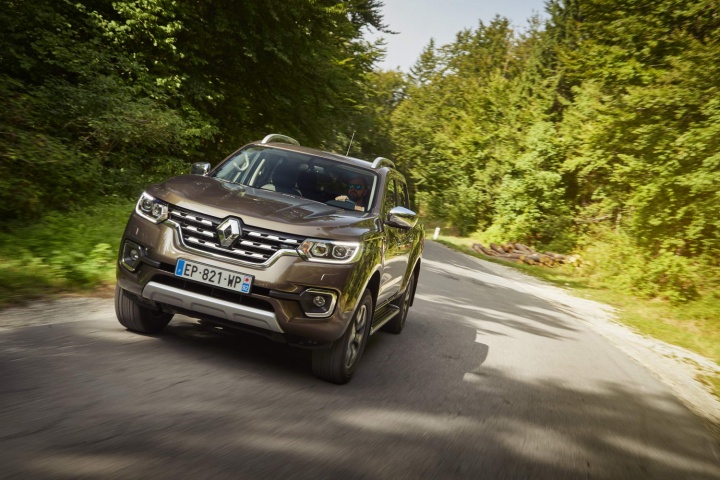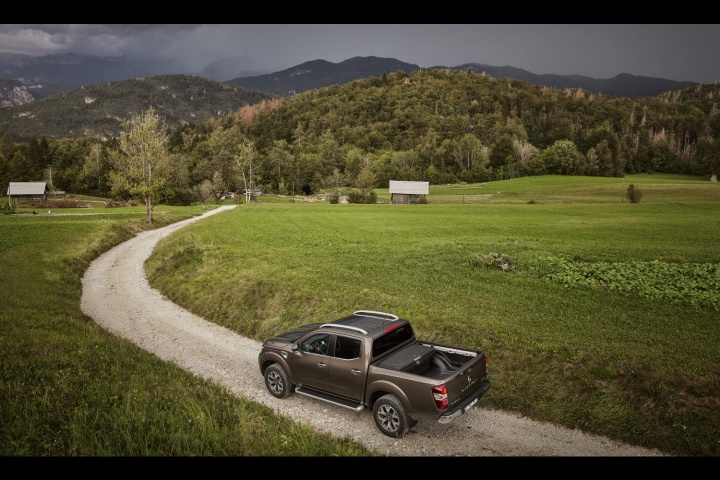As the pickup segment continues to grow in popularity, Renault enters the segment with its new Alaskan. It was a relatively easy move for Renault to make, after all, it already supplies engines for the Nissan Navara. So rather than developing its own model, Renault has simply crafted its own style onto the front of what is already an accomplished pickup.
Model tested: Renault Alaskan dCi 190
Engine: 2.3-litre twin-turbocharged four-cylinder diesel
Transmission: seven-speed automatic, selectable all-wheel drive
Body style: four-door, five-seat pickup
CO2 emissions: 183g/km (Band E, €750 per year) or €333 for commercial rate
Combined economy: 40.3mpg (7.0 litres/100km)
Top speed: 180km/h
0-100km/h: 10.8 seconds
Power: 190hp at 3,750rpm
Torque: 450Nm at 1,500- to 2,500rpm
Load bed: 1,578mm long (floor) by 1,130mm wide (between wheel arches, widest point 1,560mm, payloads from 1,047- to 1,203kg, this model 1,052kg
In the Metal:
As with most pickups, the Alaskan is an example of function over form, but it's far from being devoid of style. Be under no illusion here; this is a Nissan Navara with a new front-end grafted onto it. The new grille and headlights follow the current Renault style that you will also see on the Kadjar and Koleos, and the designers have even incorporated the new C-shaped daytime running lights. Adding to the rugged look of the range-topping model we're testing here is a metal-like finish to the lower mid-section of the front bumper.
It's an imposing enough vehicle, helped by its 223mm of ground clearance and 5,399mm overall length. Renault is only planning on offering the twin-cab design seen here, which offers a good deal of space for both front and rear passengers. Unlike some pickups, the rear seats enjoy a slight 23-degree angle, rather than being bolted upright against the bulkhead. There is a small transmission tunnel in the back to contend with, but it's not going to get in the way all that much.
Regarding quality, the materials used throughout the cabin look and feel robust enough to cope with the harder lives these vehicles can often endure. There are silver trim pieces and a piano gloss black surround on the centre console's seven-inch infotainment system. In fact, the whole interior is as it appears in the Navara, even the keyless entry and start system uses Nissan's slender key, rather than the bulky Renault key card. Our test car came equipped with heated and electrically adjustable seats, which proved comfortable over two long days of driving.
Driving it:
If you like the high-up driving position afforded by SUVs, then you'll enjoy driving the Alaskan. Visibility all round is excellent thanks to the fact that the Renault is that bit taller than most other cars on the road. You do need to remain conscious of the pickup's overall size, and as we discovered on a few particularly tight switchbacks, even the tight 12.4m turning circle requires a bit more situational awareness.
On the move, the Alaskan holds the road well and has a ride quality with greater levels of refinement that most other pickups. This smoothness is mainly due to the use of a multilink setup for the rear suspension, as opposed to the usual leaf spring arrangement that is employed by most of its rivals. The benefit of this more advanced system is that even with little or no load in the back, the rear axle doesn't feel quite as bouncy or skittish as others. Carry some speed through a bend, and it will still roll, but it remains controlled. At speeds beyond 100km/h there is some wind noise around the door mirrors, but generally the ride and refinement remain good.
The Renault's steering does feel vague a lot of the time despite being assisted. It certainly doesn't encourage you to try to find the limits of the vehicle at speed. More importantly, when it comes to parking the steering seems light, and there's good enough lock to be able to manoeuvre into tighter parking spaces.
There is a fair deal of power from the twin-turbocharged 190hp motor. The 2.3-litre four-cylinder comes with the choice of a six-speed manual or the seven-speed automatic that we're driving here. As automatics go, it's not the worst, but it does tend to hang on to each gear a smidge too long, making the engine seem more laboured than it probably is. There's isn't as much sound insulation as you would find in a larger SUV, and even in comparison to other pickups, the engine does seem gruff. With 450Nm available from 1,500rpm getting away from the line with a load in place isn't that much of a struggle. The Alaskan is rated to tow up to 3.5 tonnes, while the load bed itself can take one tonne.
When it comes to tackling more uneven terrain, the Alaskan performs impressively well. Regular driving on the road will see most people stick with the standard rear-wheel drive setting. It is possible to switch to four-wheel drive on the move and speeds of up to 100km/h. But when you need to go properly off-road you'll need to stop and select neutral before flicking to the Alaskan's 4Lo low ratio transmission. This mode makes the most of the low-end torque to help make progress over more challenging terrain. It comes equipped with a hill descent control feature that keeps the speed at a constant 4km/h without you having to touch the pedals, only steer.
What you get for your Money:
The Renault Alaskan won't arrive in Irish showrooms until March 2018, so it's still some way to go before exact pricing and specifications will be confirmed. But if we take a lead from the Nissan Navara, which it shares the majority of its components with, we can get an idea of what should be available.
Standard models are likely to come with Bluetooth, air conditioning, electric front windows, cruise control and some safety systems like emergency city brake. Moving up to mid-level models should add alloy wheels and keyless entry and start, while higher grade models will gain leather upholstery, dual-zone climate control, rear privacy glass and a reversing camera. The seven-inch touchscreen infotainment system, satellite navigation and sunroof are likely to feature as options on top models.
Alternatives
Ford Ranger: chunky looks and good carrying ability are overshadowed by a clunky drive and hefty price tag.
Nissan Navara: the Alaskan's almost identical twin. It has genuine off-road ability and is available right now.
Toyota Hilux: synonymous with the work pickup, and for a good reason. This newer model is more polished yet underneath it feels bulletproof and sturdy.
Summary
As pickups go, the Renault Alaskan does a solid job as an all-rounder. Not only is it civilised at speed on the road, but it can also hold its own when it comes to tackling the tougher terrain. If you can live with the more agricultural sounding engine, then you will be happy with everything that the Alaskan can offer. Just like the Navara, this is one of the better pickups in the segment.


